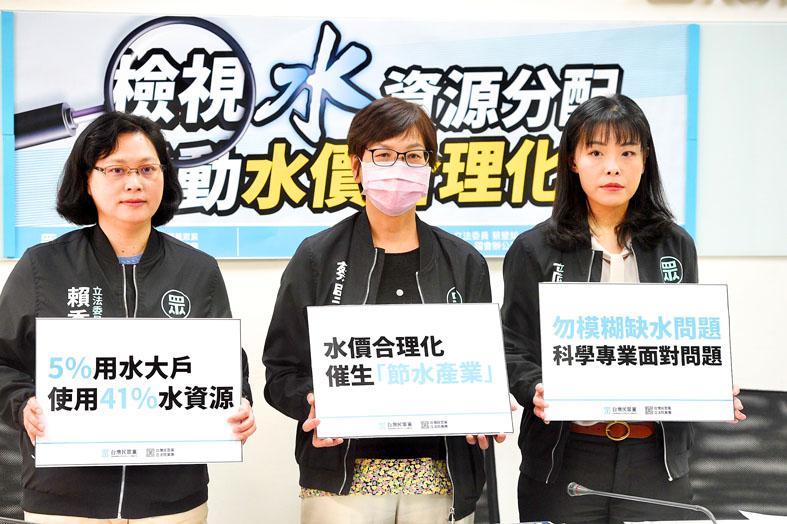The Taiwan People’s Party (TPP) caucus yesterday urged the government to develop a new water pricing scheme and push heavy users to install water conservation systems, as the nation struggles with a prolonged drought.
Whenever there is a water shortage, the agricultural sector is usually the first to be asked by the Ministry of Economic Affairs (MOEA) to cut water usage by reducing irrigation, TPP Legislator Ann Kao (高虹安) told a news conference in Taipei.
The ministry claims that the agricultural sector consumes 70 percent of the water supply, and even if the industrial sector were to reduce its usage, it would not help much with meeting general demand for water, she said.

Photo: George Tsorng, Taipei Times
The ministry’s claim is not based on science, as the agricultural sector mainly uses water from rivers and other water bodies above ground, with only 10 percent of its water coming from reservoirs, Kao said.
The nation’s farming area has shrunk by 40 percent in the past 30 years, but government data show that water consumption by the agricultural sector dropped by only 1.6 percent, suggesting a disconnect with actual water usage for irrigation, she said.
While the Council of Agriculture (COA) last year incorporated 17 local farmers’ associations into its Irrigation Agency, agency documents still referred to data collected from 2004 and 2005, which shows that it has not kept abreast of the current status of irrigation systems, she said.

Photo: CNA
Without thoroughly improving its water resources management, the government can only introduce expedient methods to increase water supply during droughts, such as drilling wells, which might affect geological stability, or building desalination plants, she added.
State-run Taiwan Water Corp (Taiwater) has been running a deficit for the past few years, with its deficit last year amounting to NT$600 million (US$21.3 million), due to unreasonable water rights distribution and prices, she said.
A desalination plant near Hsinchu City’s Nanliao Fishing Port (南寮漁港) that is to be inaugurated soon was built with a budget of NT$900 million, implying an average cost of NT$35 per unit of water, she said.
However, consumers only pay NT$12 on average per unit, which does not adequately reflect the cost of production, she said.
Kao also questioned why water resources management has to be divided among the MOEA’s Water Resources Agency, the COA’s Irrigation Agency and Taiwater, adding that the three agencies even make profits by selling water rights to one another.
When the government offers subsidies to farmers who are asked to suspend irrigation, the subsidies are actually paid by taxpayers, TPP Legislator Lai Hsiang-ling (賴香伶) said.
If the government can regularly adjust the prices of electricity and gasoline based on their fluctuating costs, it should apply the same mechanism to water prices, she said.
The government has not raised water prices for 27 years, and a new pricing mechanism is needed for heavy users to pay a more reasonable price, Lai said.
Taiwan’s average water price is the second-lowest in the world, and there are no incentives to push businesses and people to install water conservation systems, TPP Legislator Tsai Pi-ru (蔡壁如) said.
Although many water recycling and leakage improvement techniques have been commercialized, they do not have the market scope to reduce costs, she said.
Heavy water users — defined as those that consume more than 50 units — should pay a higher price to encourage them to save and conserve water, she said.

Actor Darren Wang (王大陸) was questioned by prosecutors for allegedly orchestrating an attack on a taxi driver after he was allegedly driven on a longer than necessary route in a car he disliked. The questioning at the New Taipei City District Prosecutors’ Office was ongoing as of press time last night. Police have recommended charges of attempted murder. The legally embattled actor — known for his role in the coming-of-age film Our Times (我的少女時代) — is under a separate investigation for allegedly using fake medical documents to evade mandatory military service. According to local media reports, police said Wang earlier last year ordered a

CAUTION: Based on intelligence from the nation’s security agencies, MOFA has cautioned Taiwanese travelers about heightened safety risks in China-friendly countries The Ministry of Foreign Affairs (MOFA) yesterday urged Taiwanese to be aware of their safety when traveling abroad, especially in countries that are friendly to China. China in June last year issued 22 guidelines that allow its courts to try in absentia and sentence to death so-called “diehard” Taiwanese independence activists, even though Chinese courts have no jurisdiction in Taiwan. Late last month, a senior Chinese official gave closed-door instructions to state security units to implement the guidelines in countries friendly to China, a government memo and a senior Taiwan security official said, based on information gathered by Taiwan’s intelligence agency. The

President William Lai (賴清德) should protect Taiwan Semiconductor Manufacturing Co (TSMC), and stop supporting domestic strife and discord, former president Ma Ying-jeou (馬英九) wrote on Facebook yesterday. US President Donald Trump and TSMC on Monday jointly announced that the company would invest an additional US$100 billion over the next few years to expand its semiconductor manufacturing operations in the US. The TSMC plans have promoted concern in Taiwan that it would effectively lead to the chipmaking giant becoming Americanized. The Lai administration lacks tangible policies to address concerns that Taiwan might follow in Ukraine’s footsteps, Ma wrote. Instead, it seems to think it could

Taiwan Semiconductor Manufacturing Co (TSMC), the world’s largest contract chipmaker, said yesterday that it is looking to hire 8,000 people this year, at a time when the tech giant is expanding production capacity to maintain its lead over competitors. To attract talent, TSMC would launch a large-scale recruitment campaign on campuses across Taiwan, where a newly recruited engineer with a master’s degree could expect to receive an average salary of NT$2.2 million (US$60,912), which is much higher than the 2023 national average of NT$709,000 for those in the same category, according to government statistics. TSMC, which accounted for more than 60 percent